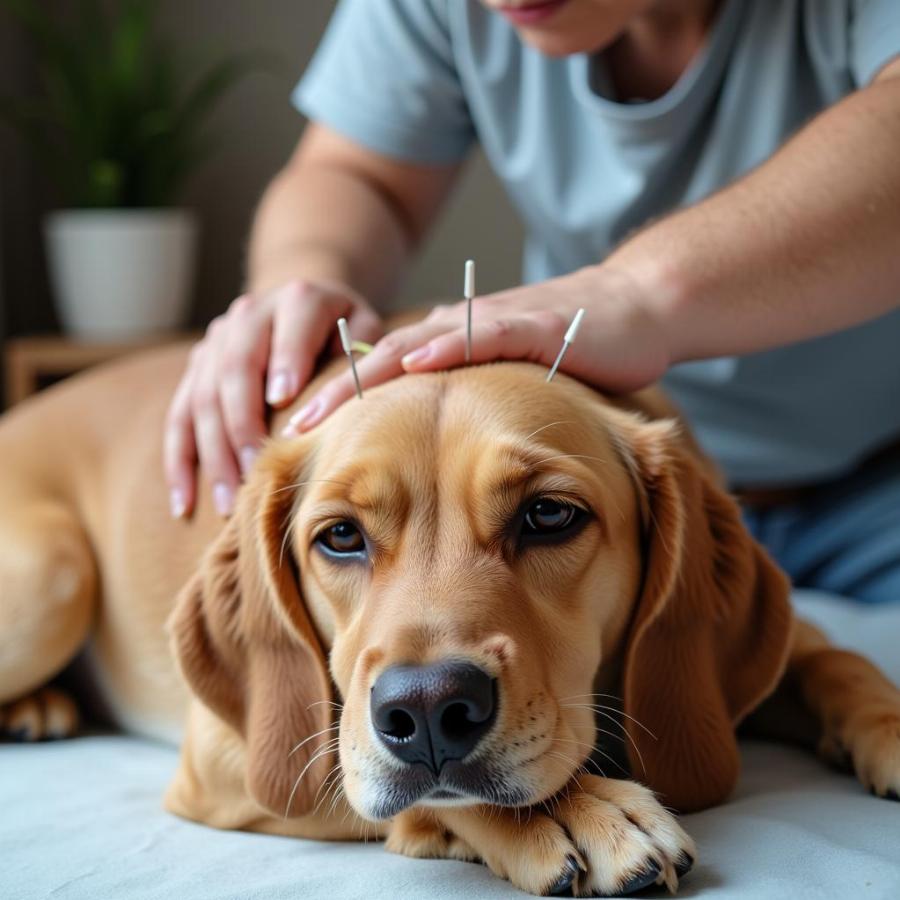Gabapentin makes my dog sad – this is a concern we hear sometimes from dog owners. While gabapentin can be a helpful medication for managing pain and seizures in dogs, it’s important to be aware of potential side effects, including changes in mood and behavior. This article will explore the relationship between gabapentin and sadness in dogs, helping you understand what to look for, what to do, and how to ensure your furry friend’s well-being.
Is My Dog’s Sadness Related to Gabapentin?
Gabapentin, while generally considered safe, can indeed cause behavioral changes in some dogs. While “sadness” is a human interpretation of canine behavior, signs that could be perceived as sadness might include lethargy, decreased appetite, withdrawal, or changes in vocalization. It’s crucial to remember that these behaviors could also stem from other underlying medical conditions, so if your dog displays any of these signs after starting gabapentin, consulting your veterinarian is paramount. They can determine if the symptoms are related to the medication or a separate health issue.
Recognizing Gabapentin Side Effects in Dogs
Aside from potential mood changes like those perceived as sadness, other common side effects of gabapentin in dogs include:
- Drowsiness/Lethargy: This is perhaps the most commonly reported side effect.
- Incoordination/Ataxia: Some dogs may experience difficulty walking or appear wobbly.
- Increased Appetite: While some dogs might eat less, others might experience an increase in appetite.
- Increased Thirst and Urination: These are less common but still potential side effects.
- Tremors: In rare cases, dogs may exhibit tremors.
What to Do If Gabapentin Makes Your Dog Seem Sad
If you suspect your dog is experiencing side effects from gabapentin, do not discontinue the medication abruptly. Sudden cessation can be dangerous. Instead, contact your veterinarian immediately. They may recommend adjusting the dosage, switching to a different medication, or exploring alternative pain management strategies.
Gabapentin Dosage and Administration in Dogs
The correct dosage of gabapentin for your dog depends on its size, health condition, and the reason for the medication. Your veterinarian will prescribe the appropriate dosage and provide instructions on how often to administer it. It’s vital to follow their instructions carefully and never adjust the dosage without their guidance.
Alternatives to Gabapentin for Pain Management in Dogs
Several alternatives to gabapentin can be used for pain management in dogs. These include other medications like nonsteroidal anti-inflammatory drugs (NSAIDs), amantadine, and tramadol, as well as non-pharmaceutical options like acupuncture, physical therapy, and laser therapy. Your veterinarian can help you determine the most suitable option based on your dog’s specific needs and health status.
 Dog Receiving Alternative Pain Therapy
Dog Receiving Alternative Pain Therapy
Conclusion: Prioritizing Your Dog’s Well-being on Gabapentin
While gabapentin can be an effective medication for dogs, it’s crucial to monitor for potential side effects, including changes in behavior that may appear as sadness. Open communication with your veterinarian is key. By working together, you can ensure your dog receives the appropriate pain management while minimizing the risk of adverse reactions and maximizing their overall well-being. If gabapentin makes your dog sad, don’t hesitate to reach out to your vet for guidance.
FAQ: Gabapentin and Canine Behavior
- Q: Can gabapentin cause depression in dogs? A: While “depression” is a complex human emotion, gabapentin can cause behavioral changes that may be perceived as sadness or depression.
- Q: How long do gabapentin side effects last in dogs? A: Side effects often subside as the dog adjusts to the medication, usually within a few days to a week.
- Q: What should I do if I miss a dose of gabapentin for my dog? A: Give the missed dose as soon as you remember, unless it’s close to the time for the next dose. Do not double up on doses.
- Q: Can gabapentin be used long-term in dogs? A: Yes, under veterinary supervision, gabapentin can be used for long-term pain management.
- Q: Are there any drug interactions I should be aware of with gabapentin? A: Yes, gabapentin can interact with certain medications, such as antacids and hydrocodone. Always inform your vet about any other medications your dog is taking.
Beaut Dogs is your trusted source for all things canine. We offer comprehensive information on dog breeds, care, health, and more. If you need personalized advice, please email us at [email protected]. Beaut Dogs is committed to helping you provide the best possible care for your beloved furry companion. Visit us at https://beautdogs.com.